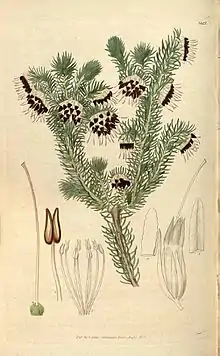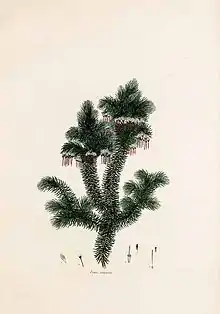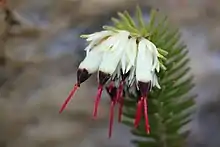| Erica recurvata | |
|---|---|
 | |
| Curtis's Botanical Magazine | |
 | |
| Henry Cranke Andrews' original illustration | |
| Scientific classification | |
| Kingdom: | Plantae |
| Clade: | Tracheophytes |
| Clade: | Angiosperms |
| Clade: | Eudicots |
| Clade: | Asterids |
| Order: | Ericales |
| Family: | Ericaceae |
| Genus: | Erica |
| Species: | E. recurvata |
| Binomial name | |
| Erica recurvata | |
Erica recurvata is a critically endangered South African species of Cape heath.
E. recurvata is a shrub of some 30 to 60 centimetres (12 to 24 inches) in height. It has dense whorls of small needle-like leaves which are pale green to grey-green in colour, and recurving in habit, hence the specific name. Clusters of sticky, pendulous flowers appear in winter, having white sepals, dark brown to almost black corollas, and with long, red, exserted styles.
First known from a botanical painting by Henry Cranke Andrews in the late 1700s, the species was rediscovered when it was found flowering near Napier in 2007. It belongs to the small Oxyloma section of Ericas. All three members having strongly exserted styles and including anthers.[1][2]
Its distribution is limited to a small area in rocky, mountainous terrain on the Overberg where it grows in crevices between sandstone boulders.[3]

References
- ↑ "Archived copy". Archived from the original on March 3, 2016. Retrieved June 8, 2016.
{{cite web}}: CS1 maint: archived copy as title (link) - ↑ Crous, Hildegard. "Photos of South African Plants - Category: Erica - Image: Erica recurvata back after 200 years". operationwildflower.org.za. Retrieved 1 July 2016.
- ↑ "Erica recurvata is endemic to just one... - Notes from a Cape Town Botanist - Facebook". facebook.com. Retrieved 1 July 2016.